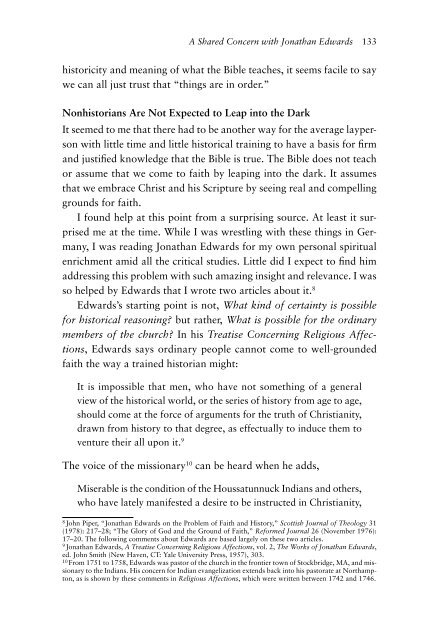Scriptures selfattesting authority question doctrine truthfulness Scriptures
peculiar-glory-en
peculiar-glory-en
Create successful ePaper yourself
Turn your PDF publications into a flip-book with our unique Google optimized e-Paper software.
A Shared Concern with Jonathan Edwards 133<br />
historicity and meaning of what the Bible teaches, it seems facile to say<br />
we can all just trust that “things are in order.”<br />
Nonhistorians Are Not Expected to Leap into the Dark<br />
It seemed to me that there had to be another way for the average layperson<br />
with little time and little historical training to have a basis for firm<br />
and justified knowledge that the Bible is true. The Bible does not teach<br />
or assume that we come to faith by leaping into the dark. It assumes<br />
that we embrace Christ and his Scripture by seeing real and compelling<br />
grounds for faith.<br />
I found help at this point from a surprising source. At least it surprised<br />
me at the time. While I was wrestling with these things in Germany,<br />
I was reading Jonathan Edwards for my own personal spiritual<br />
enrichment amid all the critical studies. Little did I expect to find him<br />
addressing this problem with such amazing insight and relevance. I was<br />
so helped by Edwards that I wrote two articles about it. 8<br />
Edwards’s starting point is not, What kind of certainty is possible<br />
for historical reasoning? but rather, What is possible for the ordinary<br />
members of the church? In his Treatise Concerning Religious Affections,<br />
Edwards says ordinary people cannot come to well-grounded<br />
faith the way a trained historian might:<br />
It is impossible that men, who have not something of a general<br />
view of the historical world, or the series of history from age to age,<br />
should come at the force of arguments for the truth of Christianity,<br />
drawn from history to that degree, as effectually to induce them to<br />
venture their all upon it. 9<br />
The voice of the missionary 10 can be heard when he adds,<br />
Miserable is the condition of the Houssatunnuck Indians and others,<br />
who have lately manifested a desire to be instructed in Christianity,<br />
8<br />
John Piper, “Jonathan Edwards on the Problem of Faith and History,” Scottish Journal of Theology 31<br />
(1978): 217–28; “The Glory of God and the Ground of Faith,” Reformed Journal 26 (November 1976):<br />
17–20. The following comments about Edwards are based largely on these two articles.<br />
9<br />
Jonathan Edwards, A Treatise Concerning Religious Affections, vol. 2, The Works of Jonathan Edwards,<br />
ed. John Smith (New Haven, CT: Yale University Press, 1957), 303.<br />
10<br />
From 1751 to 1758, Edwards was pastor of the church in the frontier town of Stockbridge, MA, and missionary<br />
to the Indians. His concern for Indian evangelization extends back into his pastorate at Northampton,<br />
as is shown by these comments in Religious Affections, which were written between 1742 and 1746.


